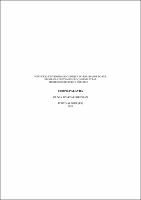| Share record |


|
Please use this identifier to cite or link to this item:
https://tede2.pucrs.br/tede2/handle/tede/6760| Document type: | Dissertação |
| Title: | Corpo-Palavra |
| Author: | Bressan, Olívia Scarpari  |
| Advisor: | Brasil, Luiz Antonio de Assis |
| Abstract (native): | Escrevo. Reescrevo. Tento uma, duas, três, infinitas vezes. A caneta resiste em continuar dando corpo à narrativa. Tomba, combalida. Me calo e me calo outra vez. As Medusas se multiplicam, mas seus-meus gritos são surdos. Por que tanto silêncio? Este trabalho fala do percurso criativo na escritura de uma narrativa autoficcional de autoria feminina e também de um processo catártico, acerto de contas com a criação literária: escrita como modo de salvar da neurose e também como desafio de constructo de linguagem. Durante o trajeto, porém, alguns percalços: como lidar com a autocensura e com a precariedade da palavra? Como diz Sartre, em seu autobiográfico As Palavras, renunciar à escrita é renunciar a si mesmo. Desta forma, para não me renunciar, encontro na narrativa autoficcional uma forma de expressão de minhas memórias e de minhas experiências, uma vez que ao criar um duplo de mim, consigo me expor, pois a autoficção não tem compromisso com a verdade – é uma ficção que se inspira e joga livremente com aspectos biográficos. Assim, lançar mão da paleta de cores oferecida pela autoficção foi a saída criadora que me permitiu escrever, fabular e achar um caminho de liberdade criativa em ambiente propício para isso: o Mestrado em Escrita Criativa da Pontifícia Universidade Católica do Rio Grande do Sul. |
| Abstract (english): | I write. I rewrite. I try one, two, three, numerous times. The pen resists in continuing to give narrative a body. It falls, fainted. I keep quiet, and I keep quiet again. The medusas are multiplying, but my-yours shouts are deaf. Why so much silence? The present essay is about a creative process while writing an autofictional narrative of feminine authorship and is also about a cathartic process, a settlement of accounts with literary creation: writing as a way of saving from neurosis and also as a challenge of language construct. During the path, however, how is it possible to deal with self-censorship and with language restrictions? As Sartre says in his memoir The Words, renouncing to write it is also renouncing to ourselves. That way, in order not to renounce, I face autofictional narrative as a form of expressing my memories and my experiences: creating a double, a persona, enables me to expose myself, since autofiction doesn’t have a commitment with truth – it is a fiction that inspires itself and plays freely with biographical aspects. Thus, using the nuances offered by autofiction was the creative alternative that enabled me to write, to fable and to find a way of creative freedom in a favorable environment for it: the Creative Writing postgraduate program of Pontifícia Universidade Católica do Rio Grande do Sul. |
| Keywords: | NARRATIVAS AUTOBIOGRÁFICAS ESCRITA CRIATIVA LITERATURA |
| CNPQ Knowledge Areas: | LINGUISTICA, LETRAS E ARTES::LETRAS |
| Language: | por |
| Country: | Brasil |
| Publisher: | Pontifícia Universidade Católica do Rio Grande do Sul |
| Institution Acronym: | PUCRS |
| Department: | Faculdade de Letras |
| Program: | Programa de Pós-Graduação em Letras |
| Access type: | Acesso Aberto |
| URI: | http://tede2.pucrs.br/tede2/handle/tede/6760 |
| Issue Date: | 29-Feb-2016 |
| Appears in Collections: | Programa de Pós-Graduação em Letras |
Files in This Item:
| File | Description | Size | Format | |
|---|---|---|---|---|
| DIS_OLIVIA_SCARPARI_BRESSAN_PARCIAL.pdf | Texto Parcial | 2.47 MB | Adobe PDF |  Download/Open Preview |
Items in DSpace are protected by copyright, with all rights reserved, unless otherwise indicated.




